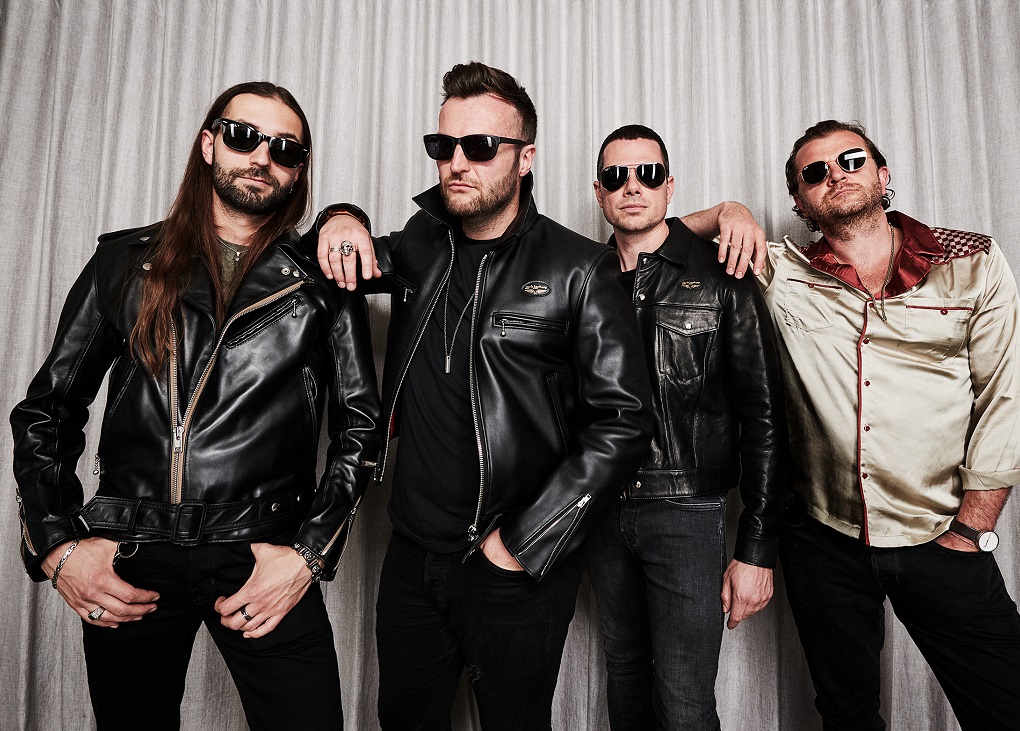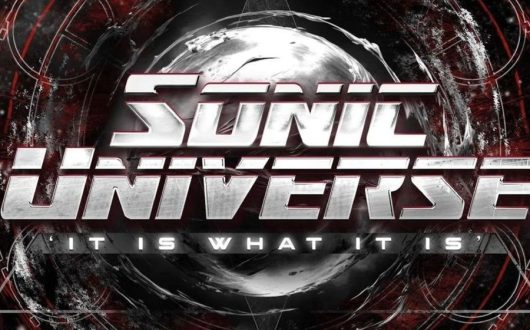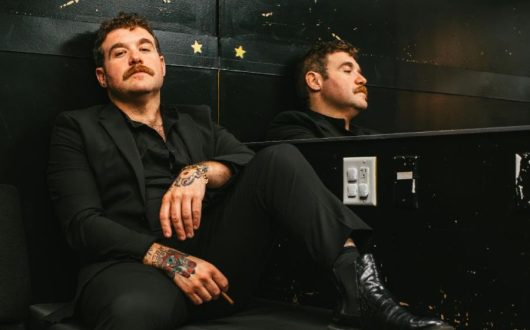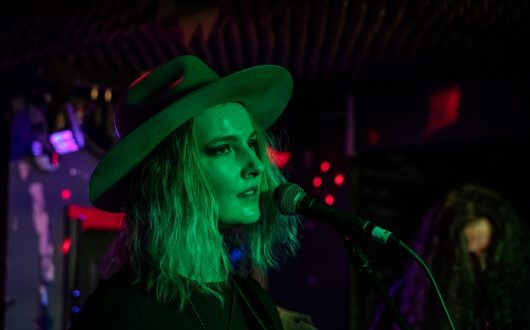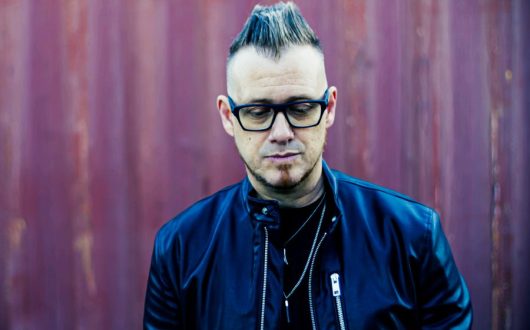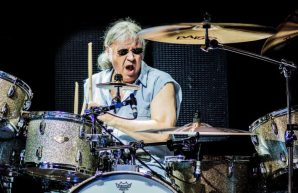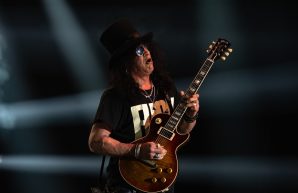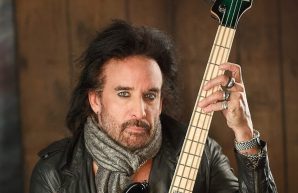Interview by Adrian Hextall
With the ‘difficult’ second album comfortably recorded with very little ‘difficult’ involved, rising rockers The Dust Coda’s lead vocalist John Drake took time to chat to us about, the new release, the awesome artwork, Beavertown Breweries and Neck Oil IPA. In addition John goes deep into his admiration of certain female vocalists, from Nina Simone, Amy Winehouse and local London based Brit Award winning artist Laura Marling, and just what he can take and learn from them and their styles.
To begin with though, beer and art…. seems like a reasonable way to start the day!
MGM: The visuals from the new album have popped up everywhere in the media. In terms of things like the coloured vinyl, the album cover, and the adverts. You have such a visual impact with it. I would imagine it’s caught a lot of people’s imagination and attention just from the look and feel.
John: We are very excited about the visuals, because it was designed by a really brilliant artist, who is the chief designer for Beavertown Brewery.
https://www.nickdwyerillustrations.com/
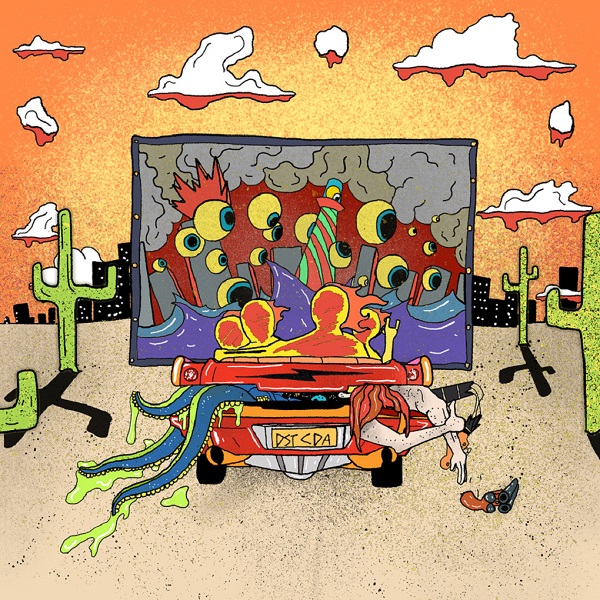
MGM: Oh, yeah.
John: And so, Nick is his name. And he designed it with us. And so, if you look at all Beavertown beer and all their designs, it is basically his style. We sat down with him and crafted with him our own version of what we thought this album cover should be. That is the thing that we are really excited about.
MGM: I have to say, that is a decent pint as well. I do like getting one of those in before you go to a gig!
John: Oh mate, do not get me started, I love Neck Oil. And I love going to gigs. [laughs]
MGM: Now to the new album, ‘Mojo Skyline’; This is an interesting one for you. It is album number two. This is supposed to be the one that was the biggest pain in the neck to put together because of course, all your energies and your ideas and your thought process will have gone into the debut.
John: Yeah.
MGM: How was it?
John: Do you know what? Sounds a bit cheeky, but it is kind of did not really feel like that. Because we work pretty autonomously. And at that point, we were a self-funded, self-driven band, I mean, we had a manager and whatnot. But we made our debut off our own back and paid for it. We made our second album and then we did a deal with Earache, but ultimately, to me, it was still just, me and Adam who wrote the songs, just getting excited about writing the songs that we do. And then getting excited about bringing them to the band. It was never really, a feeling of pressure, it was more excitement, to be honest.
MGM: That is good. Did the last year make it easier for you to do all of that? Because it has given you the time and space, which would have otherwise potentially been taken out with playing live shows. You have had the opportunity to actually get it done the way you wanted to.
John: Well, we actually recorded the album, not last year, we recorded that the year before.
MGM: So, before everything fell apart?
John: Yeah, it was done and dusted by the time lockdown came along. We had done it, we had finished tracking and we were having chats with people, and then obviously a label turned up and the rest of this is kind of history.
MGM: Yeah. You mentioned the label. I mean, you’ve got a good stable there in terms of the bands that you are playing with, haven’t you? It is a good roster to be on.
John: Oh, it is great. I mean, it is funny, I remember being a kid back in Australia when I was very little. I used to read Metal Hammer magazine when I was really young. And I used to read about this label called Earache all the time when I was reading these magazines. It is kind of funny that you know, all these years later, I end up signing with them. It is great. It is pretty cool for me.
MGM: If I look back at that era, as well, I remember Music for Nations, for example, as being one of the big ones you think, “Oh, how cool would that be? Look at the bands they have got?” You sort of imagine what their Christmas parties must have been like.
John: Oh my God, they just would have been absolutely fucking wild.
MGM: The album opens with Demon. There is a great groovy guitar hook to drag you straight into the album and hold your attention from the off. Presumably, that is obviously the intention. You want to grab your listener from the off?
John: Yeah, I think, the other guys might have different thoughts, because we all think about these things differently. But I think it was it was a group consensus how we listed the album; we all went over different variations together. But I think the reason we came to the current line-up of songs is because we wanted to basically say to anyone who is ever heard The Dust Code previously, “Hey, we’re back.”
So, we have got a couple of absolute badass rockers to start the album with. We wanted to let the world know that we are still rocking we still mean business. And you cannot argue with that. Yeah, that was the intention. It’s three Rockers, Demon, Breakdown, Limbo Man. A real case of “put that in your pipe and smoke it”.
MGM: I think every album needs a couple of songs for the listener, when they hear it the first time they go, “Oh, bloody hell. I’ve got to play that one again and again and again.” And it actually stops you progressing with the album until they have got those earworms out of the system. And for me, Jimmy Two Times is my earworm. It is stopped me moving forwards until I played it three or four times.
John: Is that right? Interesting? Because I never really considered that was one of my favourite songs off the album. To be perfectly honest, I always thought it was cool and everything. But it was never one of my favourite songs of the year. But it seems like everyone else really loves it.
MGM: Is that a common thread from people as you are talking to them for interviews?
John: Sometimes, I mean, it is just in general. The response has been pretty good to it. I mean, do not get me wrong, I love it. It is just that, when you make an album, you have certain songs for whatever reason that you feel you connect with more. I think maybe it was the reason I do not connect with as much as you, to me it’s because it was just written so quickly. And I just came up with it so quickly that I just, I cannot even really remember writing it. So sometimes when those things happen, you think it is important to you because it just came out. But when I wrote it, I wrote that song 10 years ago. It is so funny how it has gone from being a little acoustic kind of Dire Strait’s style number to like this big rocking track, which is what is great about being the Dust Cola.
MGM: So many other artists recognise that. You often hear; “Oh, yeah, you know what the biggest number is the last one we wrote for the album. We just threw it in because we needed an extra three to four minutes to complete the album.”
If you look back here, sort of the some of the classics that have been out there for years now. It’s often the afterthought and yet becomes one of their biggest ever songs.
John: That should happen, right? And that is what is great about making records.
MGM: Style wise, obviously, you will have had before, there is no denying there is a smidgen of Led Zeppelin in there. Every now and again. And you managed to mask it very well, though. I think one of the things I have written down is you have clearly made the effort to not go full on Kingdom Come for example.
John: Yeah, it is a funny one, the Led Zepp thing. Honestly, I do not think about trying to not show or hide influences. I just get together with Adam and write these songs and they come out the way they come out and to be mentioned in the same breath as Robert Plant, or Chris Cornell or Axl Rose, which I often do, to me just a massive compliment. I do not think, “Oh, God, they are nothing like us.” Because I am like, “Well, that’s great.” Because the Dust Coda is a melting pot of some really great bands and if someone mentions that we are a bit like that, or I am happy with it because we are really confident with our sound. We feel like we are honest. It is not contrived. We are not trying to contrive something and make anything like something, if you hear that part of the song do you think there is a bit of that there and then you get to the chorus and you think it is a bit more Audioslave. I’m like, “Great. Why not? I’m cool with that, man.”
MGM: I like that. And it is that mix that I think does set you apart as well.
John: Yeah, that is what does get me excited, though. From a writing point of view, we never like to go into cliché. We always try to think, “Okay, where’s this going next?” And I think because we just try to make a song as interesting as possible. I think that happens.
And we do not just rest on our laurels. I get excited myself. I love listening to Demon and it starts off like this heavy fast rocker. And then the middle section goes a little bit almost a little bit Rage Against the Machine. And I just like…, I love that because to me, honestly, it is just like, that is the show I used to listen to when I was a kid. Listen to the radio, listen to Zeppelin. I listened to Soundgarden. You know, all this stuff. And to feel it in my own music. It is great fun to kind of do it as well.
MGM: Because the music is not just for your fans. It is for you as much as it is for anybody. Unless you have the love behind it, you are not going to want to play it even if your fans love it.
John: Oh, absolutely mate especially in this day and age. I mean, God, no one’s making millions from what we are doing. Music is, in this day and age, for artists who actually really, really devote their lives to it.
MGM: It is the argument that bands have always put forward. “I am not in it for the money. I am in it for the love of music.”
Now, unfortunately, that is actually true, isn’t it? You cannot be in it for the love of money. You have got to be in it for the love of music, to begin with.
John: Yeah, I mean, do not get me wrong. I am always open to a bit of bread. [laughs]
MGM: Who is not? Yeah.
John: And I will happily accept it.
MGM: Having founded and grown the band in London, you must have every venue going? You must have done the circuit.
John: When I was a solo singer-songwriter, when I was younger, playing London and Camden and all that stuff. I just did every nook and cranny on acoustic guitar, singing and playing. And I could not even tell you the amount of different little pokey places that there are in London. When it comes to little venues and stuff. They pop up everywhere.
MGM: Presumably you’ve had shows where there will have been three people and one of them was the blind guy’s dog…. that sort of thing?
John: I can remember distinctly the night that I stopped doing it. I stopped doing acoustic solo gigs in London. I walked into a place in Camden Town somewhere. And I walked in and there was a big TV screen I saw, there is like this tiny stage underneath the TV screen I was booked for like eight o’clock and it was like five minutes to eight and I said to the girl at a bar said, “Well, what’s you know what’s going on here? Where are the engineers?”
“Tom usually turns up to engineer after the game’s finished and you’ll just be over there in front of the television.”
“Fuck this.” I went, “You know what, tell Tom he can take as long as he fucking wants” and walked out. I decided; “You know what, fuck this. I am not standing in front of a massive TV screen and playing a set whilst the football is playing.” I cannot be asked to this. I went in got three cans of Guinness went and set that fuckin park bench and sat and drank three cans of Guinness and thought, “What’s my next move?” And funnily enough, a month later, I got a call from Adam Mackey, and we started the Dusk Coda.
If you want to picture that moment and why John took that decision, take a look at this video from 10 years ago… to be fair the TV is switched off this time!
MGM: It is one of those moments, isn’t it? Where just by pure chance, he is forced you to sort of look at what next and then what next is, like, kind of landed in your lap.
John: Yeah, yeah, I just hit this point of like, this is not what it is for me. I have done years of just getting out there for years. And what is interesting about London is, there is not actually a scene in London, everyone is out for themselves. There is no, I do not really think there’s a- there probably was a little bit in, say, the 2000s, like The noughties, is that what they are called? The noughties?
MGM: Yes, The noughties. Yes.
John: There probably was a bit of that in the noughties. And so, I just spent years playing all these acoustic shows, and I had some great weeks as well, but I never connected properly.
So I went to suddenly form The Dusk Coda and then really connected with all of these rock fans around the UK, that is when I really started to felt feel connected with lots of fans with new wave of classic rock movement, that really changed everything for us.
MGM: Do you get concerned, though, that there is almost too many acts in that NWoCR bracket? It is the age-old problem, isn’t it? When thrash was a thing, everybody wanted to be a thrash band. When hair metal was a thing, everybody wanting to look like Vince Neil and so on. Do you think it is starting to get overpopulated? Or do you think there’s still enough wiggle room for everybody in this scene at the moment?
John: I think interestingly because it is not a mainstream thing. I think there’s loads of room and also as a scene. It does not seem to be a lot of snobbery about what is considered classic rock and what is not like if you are a band and you are a little bit metal and you are a bit of rock, there’s no snobbery there, you know?
And that is what’s kind of cool about it. Because it is not full of people trying to jump on to the mainstream bandwagon. Not yet. Hey, fuck it, it’d be great if we became mainstream. [laughs]
I would love that. But I seriously doubt that is going to happen, considering the state of modern music right now, though.
MGM: Well, you never know. I mean, Alice Cooper has just scored a number one with his latest album and are obviously he has got his history behind him that helped propel it but it is still a style of music. And it is a real classic rock album, as opposed to sort of a horror rock album, which he is obviously quite well known for as well. So, there the right music can still sell.
John: That is actually a really good point. What I should actually remember is that and I have always said this, I said to myself, and I used to tell people till I was blue in the face years ago that when Guns N’ Rose’s reform with their original line-up, they’ll go from being nobodies that they were for 10 years to the biggest band in the world overnight. If you remember when Guns did, they toured Not in this Lifetime which was incredible. I saw them twice. They were just literally packing out stadiums all around the world which goes to show you that rock never actually died. That sounds like a clichéd, but it is actually true.
John: Look at AC/DC, number one around the world, packing up stadiums. They’re like their own beast that just, does what it likes, and it has got fans everywhere. So, I do understand what you mean. I just guess from a popular mainstream point of view, affecting the popular culture of the masses, I cannot see it happening anytime soon. But having said that, it’s inspiring seeing 18-year-old kids make comments on our YouTube videos. It’s amazing to me.
MGM: I think there is still that element. And it is what rock appeals to as well, I remember being that 18-year-old kid, half of the buzz is finding new music. And that is where you come in. So, for me at 18, I would have wanted to find The Dust Coda because you were not mainstream, to begin with, in the hope that I could see you in small venues and feel like I was really part of it. And then watching you grow so that you did start to fill the bigger venues and feel like I am in the journey along with you.
John: Oh, for sure. Absolutely. And there is nothing like seeing a band that you know have gone from small levels of being massive. It is quite exciting.
Hopefully that comes up for us and lots of other bands.
MGM: Tell me a little bit, if you would, about the vocal side of things for you. Aside from the obvious connections, like Plant and Chris Cornell there are a number of female vocalists that you listen to because it gives your ideas about how to do different things with your vocal range?
John: Yes. Absolutely. I go through the periods where I will listen to a lot of female artists. Like, interestingly, completely different to why I think Laura Marling, [Brit Award for Best British Female Solo Artist at the 2011 Brit Awards and nominated for the same award at the 2012, 2014, 2016, and 2018 Brit Awards], she is a London folk artist that I just love, she has got incredible phrasing. Florence from Florence + The Machine, is just a remarkable singer. I sing along to her tracks just because it just helps me become a better singer. Obviously, Fleetwood Mac, and there is Heart. I could go on forever, man. And then you go back to listen to all of the soul artists like Nina Simone, and all those ladies who just kind of kicked it off all those years ago.
If you want to get a warm-up want to get as a lesson in singing and phrasing and tone and the whole thing, you go and listen to Ella Fitzgerald and Billie Holiday, that is where you kind of get some real education even as a male singer, and vice versa. I am sure female singers if they did the same with classic male singers, they do the same. It is the same thing you can mine so much from history and from different professional perspectives as an artist. I think for me listening to female artists really does that.
MGM: It is fascinating, that somebody like yourself is so open to all these influences and happily speaks about it as well. Because, again, if you go back to the dyed-in-the-wool rock fans and their viewpoints on life, the universe, and everything you would have done if you had admitted this 20 years ago with whoever was the similar artist at the time, you would have been alienated by your fan base. Well, you cannot listen to that. That is the wrong sort of music.
John: To me, music is just like food or water. It is something I consume because it keeps me alive. And it makes me feel good. I really do not think about what I should be listening to. I will just happily listen to the War on Drugs, and Bob Dylan, or Tom Petty, and then go and listen to Billy Joel. And then Amy Winehouse, and I might not listen to rock music for two weeks, and then suddenly, I will be like, “fuck it.” You know what? I have not listened to “Kill ‘Em All’ for a while. And I will put that on. I have not listened to Chaos AD or Pantera’s ‘Vulgar Display of Power’. And I put that on. Yeah. It is to me; it is all the same. As far as I am concerned. They are just people expressing themselves!
Check out our review of the new album Mojo Skyline here:
Released by: Earache Records
Release date: 26th March 2021
Line up:
Adam Mackie – Lead Guitar,
John Drake – Vocals, Rhythm Guitar,
Scott Miller – Drums,
Tony Ho – Bass,
